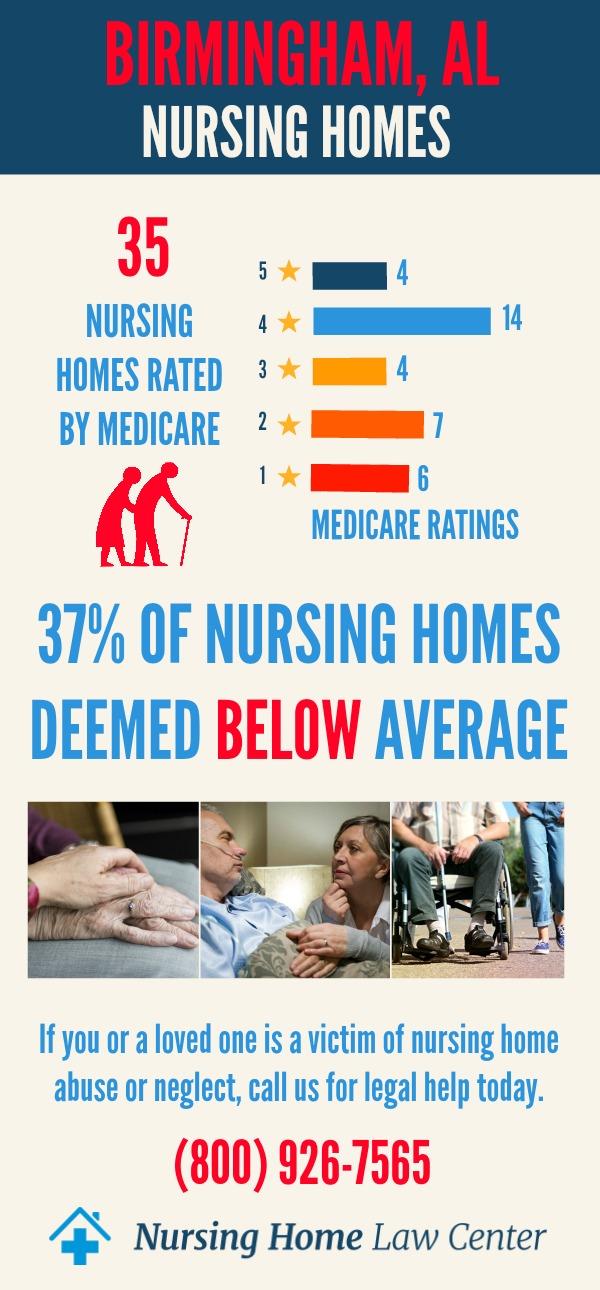The Nursing Home Law Center is committed to providing the legal resources necessary to hold negligent facilities accountable.
Birmingham Nursing Home Abuse Lawyer

Licensed in Alabama
Elder abuse is a troubling issue that affects senior citizens across Birmingham and beyond. When families place their elderly loved ones in nursing homes, they expect a standard of care that ensures safety, respect, and dignity. Sadly, some nursing facilities fail to meet these expectations.
If you suspect this has happened, it is essential to contact a Birmingham nursing home abuse lawyer. With legal assistance, you can hold the negligent nursing home accountable and seek the compensation your loved ones deserve.
Why Hire Nursing Home Law Center
At Nursing Home Law Center, we are dedicated to securing justice and fair compensation for nursing home abuse victims. Our Alabama nursing home neglect lawyers have extensive experience handling such cases and securing substantial settlements and verdicts for our clients.
We leave no stone unturned, conducting comprehensive investigations that cover every facet of abuse, from medical costs to emotional suffering and beyond. With our deep knowledge of nursing home abuse claims, we handle each case effectively, advocating relentlessly to uphold your rights.
Types of Cases Handled by Our Birmingham Nursing Home Abuse Lawyers

Elder abuse encompasses any form of harm inflicted on nursing home patients. Our nursing home lawyers are experienced in handling a wide range of abuse cases, including:
Physical Abuse
Physical abuse involves any forceful act that causes bodily harm to a nursing home resident. This assault can include hitting, shoving, or even improper use of restraints.
Mental and Emotional Abuse
Mental and psychological elder abuse involves actions or language meant to humiliate, intimidate, or isolate the resident. Examples include verbal abuse like berating residents, ignoring their needs, or threatening them.
Sexual Abuse
Sexual abuse in nursing facilities includes any non-consensual sexual contact with residents. It can range from inappropriate touching to sexual assault.
Medical Malpractice
Medical malpractice occurs when a skilled nursing facility fails to provide adequate medical care, leading to harm. Common issues include pressure injuries, which can develop from prolonged immobility, and medication errors, where patients may receive incorrect dosages.
Negligence
Nursing home negligence often results from staff members failing to meet residents’ basic needs. This negligent act includes poor hygiene, inadequate nutrition, dehydration, or even residents wandering off the premises (elopement) due to insufficient supervision.
Financial Abuse
Financial abuse involves unauthorized or deceitful use of a resident’s finances or assets. Examples include coercing residents to sign financial documents, stealing personal items, or accessing bank accounts.
Wrongful Death
In the most tragic cases, abuse and neglect in nursing homes can lead to wrongful death. When a facility’s negligent actions result in a resident’s passing, families have the right to pursue justice and compensation.
Understanding Your Legal Rights
Federal and state laws protect nursing home residents, ensuring their safety, dignity, and proper care.
The Nursing Home Reform Act of 1987 is a foundational federal law that mandates the quality of care nursing home facilities must provide. Under this law, residents have the right to freedom from abuse, neglect, and exploitation.
They are also entitled to dignity, self-determination, and the ability to participate in their care planning. Any nursing home facility that receives Medicare or Medicaid services must adhere to these standards, making the act an essential safeguard for elderly patients.
In Alabama, additional regulations complement these federal protections, overseeing nursing home operations and care standards. The Alabama Department of Public Health is tasked with licensing and regulating nursing facilities across the state, ensuring they meet specific health and safety standards.
Eligibility to File a Nursing Home Neglect Claim
The residents themselves can file a civil claim for nursing home abuse or neglect. In cases where the resident is incapacitated or has passed away, a family member or legal representative can take legal action on their behalf.
Liability in Nursing Home Neglect and Abuse Cases
In nursing home abuse and neglect cases, several parties may be held accountable depending on the circumstances of the abuse.
- Nursing Home Staff Members: Facility staff, including aides and nurses, are often directly responsible for residents’ daily care. When these individuals act abusively or neglect their duties, they can be held liable.
- Facility Management: The management team, including administrators and supervisors, is responsible for hiring, training, and overseeing staff. If management fails to vet employees properly or does not implement necessary training and oversight, they can be held accountable.
- Nursing Facility: The assisted living facility itself can also be liable, particularly if abuse or neglect occurs due to systemic issues like understaffing, poor supervision, or inadequate safety measures.
- Third-Party Contractors: Many nursing home facilities hire third-party contractors for food delivery, cleaning, or physical therapy services. If these contractors are negligent or abusive, they may be held accountable.
- Manufacturers of Medical Equipment: In some cases, defective medical equipment, such as wheelchairs or monitoring devices, may contribute to injuries. If a resident is harmed due to faulty equipment, the manufacturer could be liable for damages related to the injury.
How Our Birmingham Nursing Home Abuse Attorneys Can Help
Our nursing home neglect attorneys have extensive experience advocating for victims and family members affected by nursing home abuse and neglect. Here’s how we can help:
Free Legal Consultation
We offer a no-obligation, free case evaluation to help families understand their legal options. During this consultation, our nursing home abuse attorneys review the details of your case, answer your questions, and explain the possible steps forward.
Case Investigation
Our legal team conducts thorough investigations to uncover evidence of abuse or neglect. This process includes reviewing medical records, interviewing witnesses, and examining facility records. By gathering detailed information, we can identify responsible parties and build a strong nursing home abuse case to support the victim’s claims.
Filing the Claim
Once we have collected the necessary evidence, we handle the entire process of filing a nursing home abuse lawsuit. This step involves drafting the legal documents, submitting them within the required timelines, and ensuring that all paperwork is accurately completed.
The nursing home abuse attorney appointed to your case handles every legal aspect so you can focus on supporting your loved one’s recovery.
Settlement Negotiation
Our nursing home neglect lawyers are skilled negotiators and will work with insurance companies or other liable parties to seek a fair settlement. We aim to secure compensation that covers medical expenses, emotional trauma, and other damages sustained by the victim.
We always prioritize our client’s best interests, ensuring that any settlement reflects the extent of harm suffered.
Trial Representation
If a fair settlement cannot be reached, our law firm is fully prepared to take the case to trial. We have extensive experience advocating for abuse victims in court and securing the maximum compensation available under the law. Our attorneys are dedicated to holding negligent nursing facilities accountable for your loved one’s injuries.
Common Signs of Elder Abuse Among Nursing Home Residents
Of the 38 Medicare-certified nursing homes in Birmingham, 30 facilities (79%) are struggling with their overall rating. Specifically, 29 nursing homes (76%) fall short in health inspections, and 14 facilities (37%) have inadequate staffing levels. 11 nursing homes (29%) scored poorly in quality measures. [1]
Recognizing the common signs of elder abuse among nursing home residents is critical for families to protect their loved ones. These include:
- Unexplained bruises, cuts, fractures, or burns
- Poor hygiene and unsanitary living conditions
- Malnutrition and dehydration
- Pressure sores
- Financial irregularities
- Behavioral changes
- Urinary tract infections
- Frequent hospital visits
- STDs or injuries in sensitive areas
The worst-rated nursing homes in Birmingham include:
| Arlington Rehabilitation & Healthcare Center | Aspire Physical Recovery Center at Cahaba River |
| Aspire Physical Recovery Center at Hoover, LLC | Brookdale University Park Snf (AL) |
| Caregivers of Pleasant Grove, Inc | Cherry Hill Rehabilitation & Healthcare Center |
| Diversicare of Bessemer | Elite Nursing and Rehabilitation Care Center |
| Galleria Woods Skilled Nursing Facility | Legacy Health and Rehabilitation of Pleasant Grove |
| Magnolia Ridge | North Hill Nursing and Rehabilitation Ctr, LLC |
| Oak Crest Health & Wellness | Oak Knoll Health and Rehabilitation, LLC |
| Oaks on Parkwood Skilled Nursing Facility | Ridgeway Rehabilitation & Senior Living |
| Self Skilled Nursing & Rehab | Village at Cook Springs Skilled Nursing Facility |
What to Do If You Suspect Nursing Home Abuse
If you suspect abuse in a Birmingham nursing home, it’s crucial to take swift and decisive action.
Call 911 if Immediate Danger is Present
If your loved one is in immediate danger or has suffered serious injuries in a nursing home, contact emergency services immediately. Law enforcement and medical personnel can provide urgent assistance and document injuries for potential legal action.
Report to the Nursing Home Administrator or Management
Inform the nursing home’s management or administrator about your concerns. They are required to address and investigate complaints of abuse. Document your communication with them and request a formal response.
File a Complaint with Your Local Ombudsman’s Office
The local Ombudsman’s office is responsible for investigating complaints and advocating for the rights of nursing home residents. Ombudsmen act as neutral third parties, helping many families resolve issues and ensuring nursing facilities uphold care standards.
Filing a complaint with the Ombudsman’s office can prompt further investigation and pressure the facility to make necessary improvements.
Contact a Nursing Home Abuse Lawyer
Consult a qualified nursing home abuse lawyer to understand your legal options and determine the best action. A neglect attorney can help you gather evidence, file a claim, and recover compensation for your loved one. A legal professional with experience in nursing home abuse cases can provide guidance and advocate for the justice your family deserves.
Contact a Birmingham Nursing Home Abuse Attorney Today!
At Nursing Home Law Center, our experienced nursing home attorneys are dedicated to seeking justice for elderly residents who have suffered abuse or neglect. With a proven track record of successful outcomes, we fight to secure compensation for victims and hold negligent nursing homes accountable.
Contact us today for a free consultation and take the first step toward protecting your loved one’s rights and well-being.
Call us at (800) 926-7565 or complete our contact form.
References: [1] Medicare

